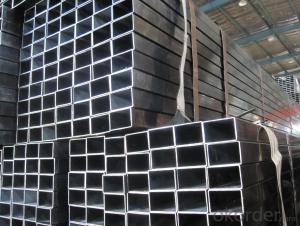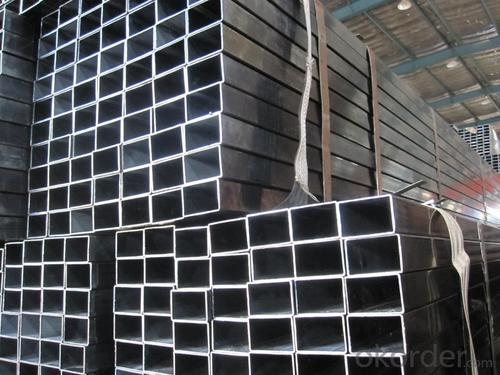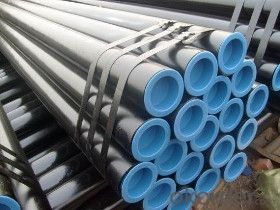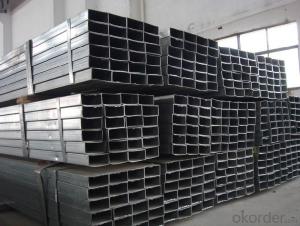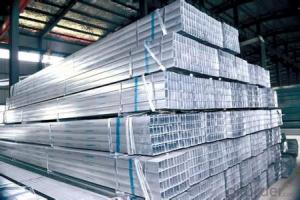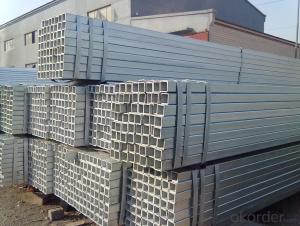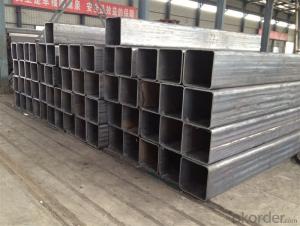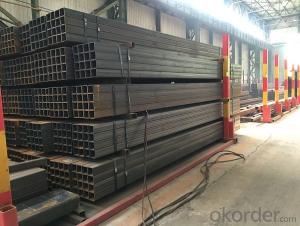Hollow sections mild steel rectangular pipes
- Loading Port:
- Tianjin
- Payment Terms:
- TT or LC
- Min Order Qty:
- 20 m.t.
- Supply Capability:
- 9000 m.t./month
OKorder Service Pledge
OKorder Financial Service
You Might Also Like
1、Structure of Seamless Pipe ASTM A106/53:
Seamless pipe is formed by drawing a solid billet over a piercing rod to create the hollow shell. As the manufacturing process does not include any welding, seamless pipes are perceived to be stronger and more reliable. Historically seamless pipe was regarded as withstanding pressure better than other types, and was often more easily available than welded pipe.
Application
carbon seamless steel pipes are widely used in gas, water and oil, transpotation;constructions;Bridge,highway,windows of model steel door; building materials;fences;heating facilities Fluid Pipe;conduit pipe,scaffolding pipe.etc.
Payment Terms: L/C D/A D/P T/T
Packing and shipment
Packaged in bundles,as per customers' requirements, it can also bepackagesd as beveled ends, typed marking, black painting, plastic caps protection,woven bags packing
For 20" container the max length is 5.8m; For 40" container the max length is 12m. other options are available based on customer requests. Please discuss when placing orders.
2、Main Features of the Seamless Pipe ASTM A106/53:
• High manufacturing accuracy
• High strength
• Small inertia resistance
• Strong heat dissipation ability
• Good visual effect
• Reasonable price
3、Seamless Pipe ASTM A106/53 Specification:
Standard | GB, DIN, ASTM ASTM A106-2006, ASTM A53-2007 |
Grade | 10#-45#, 16Mn 10#, 20#, 45#, 16Mn |
Thickness | 8 - 33 mm |
Section Shape | Round |
Outer Diameter | 133 - 219 mm |
Place of Origin | Shandong, China (Mainland) |
Secondary Or Not | Non-secondary |
Application | Hydraulic Pipe |
Technique | Cold Drawn |
Certification | API |
Surface Treatment | factory state or painted black |
Special Pipe | API Pipe |
Alloy Or Not | Non-alloy |
Length | 5-12M |
Outer Diameter | 21.3-610mm |
Grade | 20#, 45#, Q345, API J55, API K55, API L80, API N80, API P110, A53B |
Standard | ASME, ASTM |
1) Material:20#(ASTM A 106/A53 GRB.API5LGRB,GB),45#,16Mn,10#.
2) Specification range:OD:21.3-610mm,WT:6-70mm,length:6-12m or according to the requirement of clients.
3) Excutive standards:GB,ASME API5L.ASTM A 106/A53,Despite of the above standards,we can also supply seamless steel pipe with standard of DIN,JIS,and so on,and also develop new products according to the requirements of our clients!
4) Surface:black lacquered,varnish coating or galvanized.
5) Ends:Beveled or square cut,plastic capped,painted.
6) Packing:bundles wrapped with strong steel strip,seaworthy packing.
4、Packaging & Delivery
Packaging Details: | seaworthy package,bundles wrapped with strong steel strip |
Delivery Detail: | 15-30days after received 30%TT |
5、FAQ of Seamless Pipe ASTM A106/53:
①How is the quality of your products?
Our products are manufactured strictly according to national and internaional standard, and we take a test
on every pipe before delivered out. If you want see our quality certifications and all kinds of testing report, please just ask us for it.
Guaranteed: If products’ quality don’t accord to discription as we give or the promise before you place order, we promise 100% refund.
②How about price?
Yes, we are factory and be able to give you lowest price below market one, and we have a policy that “ for saving time and absolutely honest business attitude, we quote as lowest as possible for any customer, and discount can be given according to quantity”,if you like bargain and factory price is not low enough as you think, just don’t waste your time.Please trust the quotation we would give you, it is professional one.
③Why should you chose us?
Chose happens because of quality, then price, We can give you both.Additionally, we can also offer professional products inquiry, products knowledge train(for agents), smooth goods delivery, exellent customer solution proposals.Our service formula: good quality+good price+good service=customer’s trust
SGS test is available, customer inspection before shipping is welcome, third party inspection is no problem.
6、Seamless Pipe ASTM A106/53 Images:
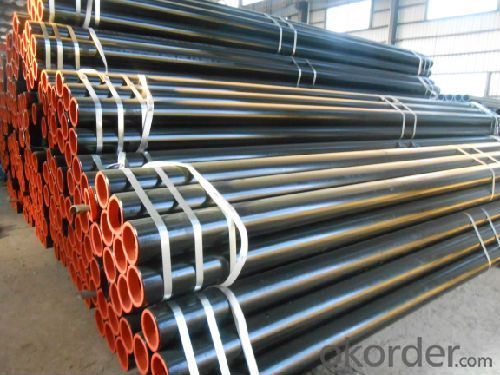
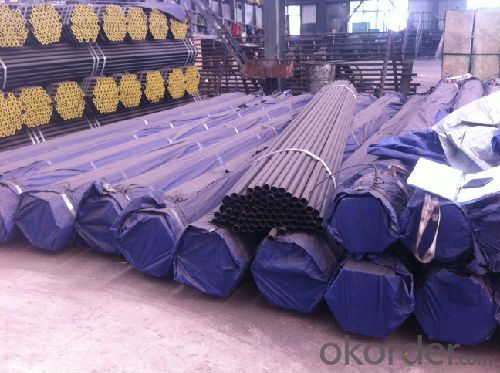
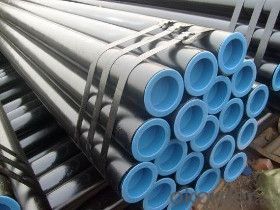
- Q: How do steel pipes handle high-pressure applications?
- Steel pipes are commonly used in high-pressure applications because of their inherent strength and durability. The high tensile strength of steel allows it to withstand the pressure exerted on the pipes without deforming or bursting. Moreover, steel pipes are resistant to corrosion, making them ideal for handling various types of fluids and gases under high-pressure conditions. Additionally, the seamless construction of steel pipes eliminates weak points and ensures their reliability and safety in high-pressure environments.
- Q: SC15 what does galvanized steel pipe look like?
- Ordinary galvanized steel pipe, the outer diameter is 1.5 inches
- Q: How are steel pipes protected during transportation and storage?
- Steel pipes are usually protected during transportation and storage through various measures such as coating them with anti-corrosion materials, wrapping them with protective films or tapes, using wooden crates or pallets for stacking and securing them with straps or bands. Additionally, pipes are often stored in covered or climate-controlled warehouses to prevent exposure to moisture and other potential damaging elements.
- Q: How do you calculate the flow rate through a steel pipe?
- To calculate the flow rate through a steel pipe, you need to consider several factors. The most important ones are the diameter of the pipe, the pressure difference across the pipe, and the properties of the fluid flowing through it. Firstly, measure the inside diameter of the steel pipe accurately. This measurement is essential as it determines the cross-sectional area through which the fluid flows. The units for the diameter should be consistent with the units used for other measurements. Next, determine the pressure difference across the pipe. This can be done by measuring the pressure at two points along the pipe, typically at the inlet and outlet. The pressure measurements should be taken at the same height to avoid any discrepancies. The pressure difference is usually given in units of pressure (such as psi, kPa, or bar). Once you have the diameter and pressure difference, you can use the Bernoulli equation or the Darcy-Weisbach equation to calculate the flow rate. The Bernoulli equation relates the pressure difference to the velocity of the fluid. However, this equation assumes ideal conditions, neglecting factors such as friction losses, viscosity, and turbulence. The Darcy-Weisbach equation is more accurate and considers these factors. To use the Darcy-Weisbach equation, you need to know the properties of the fluid flowing through the pipe, such as its density and viscosity. These properties can be determined either through experimentation or by referring to literature values. Once you have all the necessary information, you can use the Darcy-Weisbach equation: Q = (π/4) * D^2 * √[(2 * ΔP) / (ρ * f * L)] Where: Q is the flow rate (in cubic meters per second or any other consistent units) D is the diameter of the pipe (in meters or any other consistent units) ΔP is the pressure difference across the pipe (in Pascals or any other consistent units) ρ is the density of the fluid flowing through the pipe (in kilograms per cubic meter or any other consistent units) f is the friction factor, which depends on the Reynolds number and the roughness of the pipe. L is the length of the pipe (in meters or any other consistent units) By plugging in the values for all the variables, you can calculate the flow rate through the steel pipe accurately.
- Q: Can steel pipes be used for conveying sewage sludge?
- Indeed, sewage sludge can be conveyed using steel pipes. Steel pipes possess several properties that render them suitable for this purpose. Firstly, their strength and durability enable them to endure the pressure and weight of sewage sludge without collapsing or fracturing. This is of utmost importance as sewage sludge can be quite heavy and may contain solids that could exert stress on the pipes. Secondly, steel pipes exhibit resistance to corrosion, which is crucial when conveying sewage sludge that frequently contains corrosive components. By utilizing corrosion-resistant steel pipes, one can ensure a prolonged lifespan and minimize the risk of leaks or damage. Moreover, steel pipes can be manufactured in various sizes and diameters, granting flexibility in the design of sewage systems to meet specific requirements. Nonetheless, it is vital to emphasize the necessity of proper maintenance and regular cleaning to prevent sludge buildup and maintain the pipes' efficiency.
- Q: D108*4 what does "D108" mean by seamless steel tubes? What does "*4" mean?
- D108: refers to the outer diameter of 108mm;4: refers to the wall thickness of 4mm.
- Q: What is the composition of steel pipes?
- Steel pipes are primarily composed of iron and carbon, with small amounts of other elements such as manganese, silicon, and traces of sulfur and phosphorus.
- Q: What are the different methods of pipe joining for steel pipes?
- Steel pipes can be joined using various methods, each with its own benefits and drawbacks. These methods include: 1. Butt Welding: Two steel pipes are welded together by beveling or facing their ends to form a V-groove. Molten metal is then used to fill the groove, creating a strong and long-lasting joint. 2. Socket Welding: A socket is welded onto the end of a steel pipe, and another pipe is inserted into the socket and welded in place. This method creates a leak-proof and corrosion-resistant joint. 3. Threaded Joint: Steel pipes can be joined by threading the ends and using a threaded coupling or union to connect them. This method is commonly used for smaller pipes and allows for easy disassembly and reassembly. 4. Flanged Joint: For larger pipes, a flange is attached to the end of each pipe, and the flanges are fastened together with gaskets using bolts. This method is commonly used in industries such as oil and gas, water treatment, and chemical processing. 5. Grooved Joint: Grooving machines are used to create a groove on the outside of the pipe. A coupling or fitting is then inserted into the groove and secured with bolts or clamps. This method is quick to install and allows for easy disassembly and reassembly. The choice of pipe joining method depends on factors such as pipe size, application, and desired strength and durability. Each method has its own advantages and disadvantages.
- Q: What is the cost of steel pipes compared to other materials?
- The cost of steel pipes can vary depending on various factors such as size, grade, and market conditions. However, generally speaking, steel pipes tend to be more cost-effective compared to other materials like copper or PVC. Steel is a durable and versatile material that offers exceptional strength and longevity, making it a popular choice for various applications.
- Q: Can steel pipes be used for irrigation pivot systems?
- Yes, steel pipes can be used for irrigation pivot systems. They are often preferred due to their durability, strength, and resistance to corrosion. Steel pipes can efficiently transport water over long distances, making them suitable for irrigation pivot systems that require reliable water supply.
Send your message to us
Hollow sections mild steel rectangular pipes
- Loading Port:
- Tianjin
- Payment Terms:
- TT or LC
- Min Order Qty:
- 20 m.t.
- Supply Capability:
- 9000 m.t./month
OKorder Service Pledge
OKorder Financial Service
Similar products
Hot products
Hot Searches
Related keywords
